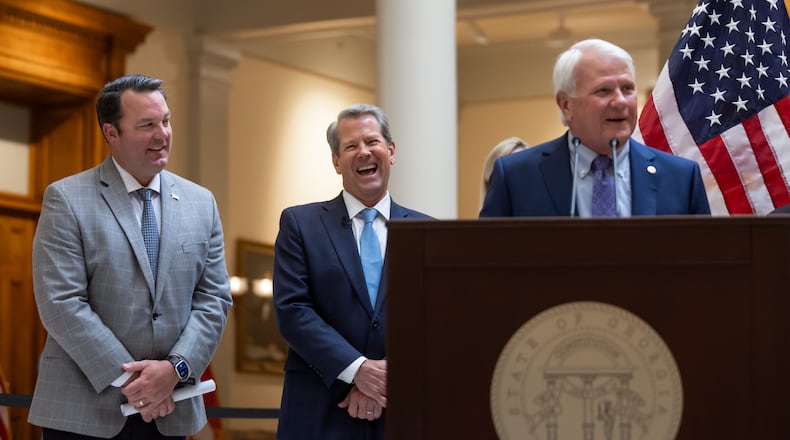Clout is a precious resource at the Georgia Capitol. And 236 lawmakers — 180 in the House and 56 in the Senate — are all jockeying to pass their priorities or block measures they oppose. Here’s a guide to some of the movers and shakers at the General Assembly.
GOVERNOR
Brian Kemp: Like all governors, Kemp will set the agenda for the session, and Georgia’s strong balance sheets will strengthen his hand this year as he decides how to spend — or not spend — more than $16 billion in state reserve funds. As he enters the final stretch of his second term, he’s also looking to reassert his political clout. Kemp and President-elect Donald Trump have reached a tentative truce after years of feuding, and the governor will be under immense pressure to challenge Democratic U.S. Sen. Jon Ossoff in 2026. Recently elected to lead the Republican Governors Association, Kemp will balance his 2025 push to overhaul litigation rules with a growing role in the national GOP. He’ll have plenty on his plate at the Gold Dome, with vast powers to decide how much money lawmakers appropriate, veto legislation and spending, and dole out judgeships and other jobs.
LIEUTENANT GOVERNOR
Burt Jones: Once a rank-and-file member of the state Senate with a knack for ticking off his party’s leadership, Jones is now one of the most powerful Republicans in the state and has a firm grip on his chamber. A close ally of Trump, Jones leads the Georgia Senate and is expected to announce a run for governor in early 2025. He isn’t shy about pushing his own agenda even if it differs from Kemp’s policy goals, nor is he afraid to allow politically divisive issues to reach a Senate vote. That’s what happened in 2023 when a pro-Buckhead cityhood revolt was smothered and a year later when a Senate committee narrowly defeated a surprise Medicaid expansion push. Jones is expected to reassert his political might in 2025 as he prepares for a gubernatorial run, but he’ll also have to contend with maneuvering by a number of state senators from both parties with their own plans to run for higher statewide offices.
Credit: Arvin Temkar/AJC
Credit: Arvin Temkar/AJC
KEY SENATORS
Credit: Arvin Temkar/AJC
Credit: Arvin Temkar/AJC
Senate President Pro Tem John Kennedy, R-Macon: The Middle Georgia lawyer was first elected to the Senate in 2014 and rose quickly, serving as a gubernatorial floor leader and majority caucus chair. He led the Senate Redistricting Committee, which redrew political lines in 2021 to ensure the GOP maintained its majority — lines that were later thrown out by a federal judge. He’s viewed as a calm and calculating arbiter of the GOP’s policy positions who shows little zeal for political brawls, but that could change as he positions himself for a potential run for higher office. The president pro tem is second in charge of the Senate.
Credit: arvin.temkar@ajc.com
Credit: arvin.temkar@ajc.com
Senate Majority Leader Steve Gooch, R-Dahlonega: He was first elected to the state Senate in 2010 and served as the GOP caucus whip from 2014 until his election as majority leader in November 2022. Before being elected as whip, he was the Senate Transportation Committee chairman. Gooch is an aggressive spokesman for the GOP agenda and a die-hard MAGA supporter — so much so that he pressed for the creation of an “America First” license plate in 2024. He’s expected to run for lieutenant governor in 2026.
Credit: Natrice Miller/AJC
Credit: Natrice Miller/AJC
Sen. Blake Tillery, R-Vidalia: First elected to the Senate in 2016, the Republican rose quickly to head the chamber’s budget committee, taking over in 2020 after longtime Appropriations Chair Jack Hill died. His first budget was a trial by fire, with 10% funding cuts during the COVID-19 pandemic. Since then, he has been in the opposite situation: The state has had record revenue and record spending. A fiscal conservative, Tillery is the General Assembly’s budget veteran now and, as a country lawyer, is good at picking apart requests for higher government spending. He’s also seen as a likely candidate for higher office in 2026.
Credit: TNS
Credit: TNS
Sen. Jason Anavitarte: A former Doraville city councilman, Anavitarte was elected to represent a west Georgia-based Senate seat in 2020 and is now one of the state’s most prominent Latino elected officials. He’s often in the middle of some of the thorniest political debates, including measures to restrict the use of TikTok, create a sales tax holiday for firearms purchases and honor U.S. Supreme Court Justice Clarence Thomas at the state Capitol. As the Senate majority caucus chair, he’s charged with helping to raise money and set the agenda for fellow Republicans.
Credit: Arvin Temkar/AJC
Credit: Arvin Temkar/AJC
Senate Minority Leader Harold Jones II: As the newly minted top Democrat in the chamber, Jones has a tricky task ahead in a chamber where Republicans dominate 33-23. The Augusta attorney has to hold together his sometimes fractious caucus while determining which GOP-led policies to fight and where to press for compromise. Elected to succeed retiring state Sen. Gloria Butler, who served in the chamber for more than two decades, Jones has made clear that Medicaid expansion and gun control measures are among his top priorities.
Credit: TNS
Credit: TNS
State Sen. Jason Esteves, D-Atlanta: The former chair of the Atlanta public school board is viewed as a rising star in the Georgia Senate. A steadfast supporter of abortion rights and Medicaid expansion, Esteves has also developed expertise in education-related measures since his 2022 election. He is an outspoken critic of efforts to ban transgender girls from competing in high school sports and led efforts to oppose a school voucher program that was narrowly adopted in 2024.
Others: Senate Majority Whip Randy Robertson, R-Cataula; Senate Rules Chair Matt Brass, R-Newnan; Senate Regulated Industries Chair Bill Cowsert, R-Athens; Senate Minority Whip Kim Jackson, D-Stone Mountain; Senate Democratic Caucus Chair Elena Parent, D-Atlanta; Senate Democratic Caucus Vice Chair Sonya Halpern, D-Atlanta; Senate Finance Chair Chuck Hufstetler, R-Rome.
HOUSE
Credit: TNS
Credit: TNS
Speaker Jon Burns, R-Newington: Burns had a long, if somewhat under the radar, tenure in House leadership before ascending to the speaker’s podium. First elected to the General Assembly in 2004, he served as majority leader from 2015 until being elected speaker in January 2023, two months after longtime House Speaker David Ralston’s death. Like Ralston, Burns has been a champion for rural Georgia, a prerequisite for a House speaker. Like Ralston, he’s also seen as levelheaded and plainspoken in a 180-member chamber that can be unruly at times. A strong supporter of Kemp’s initiatives, Burns has also continued Ralston’s push to increase spending and back legislation to improve the state’s mental health system. Unlikely to seek higher office himself, Burns must now contend with navigating a Gold Dome full of ambitious lawmakers looking to make names for themselves.
Credit: Natrice Miller/AJC
Credit: Natrice Miller/AJC
Speaker Pro Tem Jan Jones, R-Milton: A smart, stable leader from a politically important part of metro Atlanta, Jones became the state’s first female House speaker when Ralston died. She returned to the post she had held, speaker pro tem — essentially second in charge of the House — after Burns was elected speaker. A former journalist and marketing executive, Jones has been able to win reelection in a part of metro Atlanta that is trending Democratic.
Credit: Miguel Martinez/AJC
Credit: Miguel Martinez/AJC
House Majority Leader Chuck Efstration, R-Dacula: The Gwinnett County lawyer took on a new role two years ago as majority leader after serving as head of the House Judiciary Committee, where he pushed a wide array of legislation, including changes in ethics laws, the repeal of the state’s citizen’s arrest law and passage of a hate-crimes statute. Now his job is to lead a Republican caucus while also navigating his own ambitions. Efstration, a lawyer, is often seen as a potential candidate to succeed Attorney General Chris Carr, who is running for governor.
Credit: TNS
Credit: TNS
House Minority Leader Carolyn Hugley: The Columbus Democrat is one of the most veteran members of the Georgia House, having first won election to represent a Columbus-based district 32 years ago. After three previous defeats in races for minority leader, she won the post in November with a promise to help the party move forward after a tumultuous election. Although Democrats gained two seats in the House, party leaders were expected to cut deeper into the GOP’s advantage after a court-ordered realignment of political maps left several Republicans vulnerable. A calm strategist known for holding her caucus together during tough votes, she plans to “reconstruct our Democratic agenda to reflect the challenges that our citizens face.”
Credit: Natrice Miller/AJC
Credit: Natrice Miller/AJC
House Minority Caucus Chair Tanya Miller: The former prosecutor defeated state Rep. Billy Mitchell in November to win the party leadership post with a vow to reach new voters “through a fresh set of eyes.” First elected in 2022, the Atlanta Democrat campaigned on promises of bringing about a “community-centered” criminal justice system and expanded voting rights. Comfortable on cable TV news and in crowded committee rooms, Miller is seen as an emerging party leader.
Credit: Arvin Temkar/AJC
Credit: Arvin Temkar/AJC
Rep. Matt Hatchett, R-Dublin: The House Appropriations chair was chosen in 2022 to replace longtime budget chief Terry England, who is now a top aide to Burns. The committee plays a key role in deciding how the state spends more than $33 billion a year. Hatchett successfully headed House Republican campaign fundraising efforts and was in the majority leadership for years, so the transition to heading the most important committee in the chamber has gone smoothly. With an impressive grasp of financial issues, Hatchett is also devoted to using his Capitol clout to help victims of Hurricane Helene, which ravaged his east Georgia district along with other parts of the state.
Others: Public Health Chair Sharon Cooper, R-Marietta; House Ways and Means Chair Shaw Blackmon, R-Bonaire; House Minority Whip Sam Park, D-Lawrenceville; House Regulated Industries Chair Alan Powell, R-Hartwell.
About the Author
Keep Reading
The Latest
Featured










